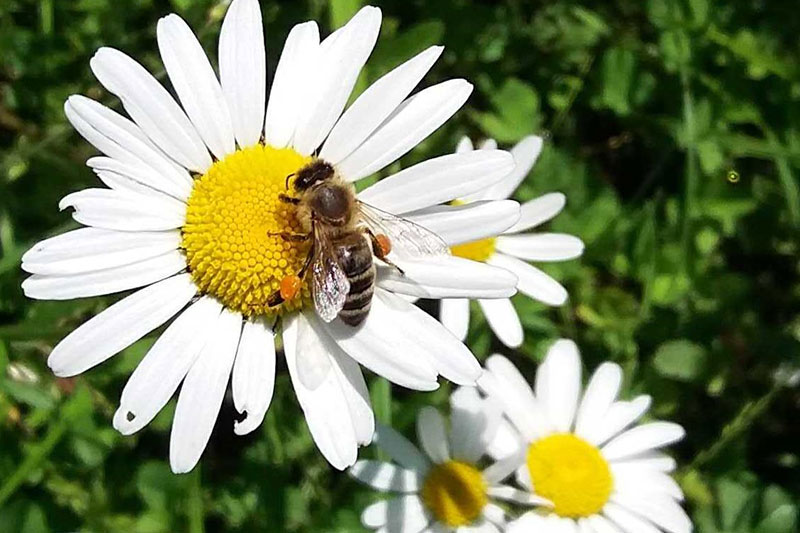Die heimischen Honigbienen sind relativ gut über den letzten Winter gekommen: Nur 12,5 Prozent der Völker haben die kalte Jahreszeit nicht überlebt. „Damit liegen wir in etwa auf dem Niveau des Vorjahres“, erklärt Robert Brodschneider vom Institut für Biologie der Universität Graz, der die Studie seit mehr als einem Jahrzehnt durchführt. Heuer standen ihm dafür die Angaben von mehr als 1400 Imkereien mit 30.000 Bienenvölkern zur Verfügung. „Die Datenlage erlaubt auch kleinräumige Auswertungen, die zeigen, dass in einigen wenigen Bezirken Ausfälle von zwanzig Prozent oder sogar mehr zu verzeichnen waren“, ergänzt der Biologe.
Die verlorenen Völker werden üblicherweise im Laufe des Jahres durch die Arbeit der ImkerInnen wieder aufgebaut. Dennoch bescheren die Verluste dem Sektor finanzielle Einbußen: 32 Millionen Euro waren das laut Brodschneiders jüngster Studie im Winter 2016/17, in dem 23 Prozent der Bienenvölker starben. „Dies unterstreicht nicht nur die biologische Relevanz unserer Forschung, sondern auch den ökonomischen Stellenwert der Honigbiene in Österreich“, so der Wissenschafter. Aus dem umfangreichen, mehrjährigen Datensatz kann das Team der Universität Graz Ursachen und Maßnahmen zur Reduktion von Winterverlusten ableiten.
Wintersterblichkeit von Honigbienen 2020/21
| Verlustrate in Prozent | teilnehmende Imkereien | Beteiligung der Imkereien in Prozent | |
| Österreich | 12,5 | 1406 | 4,4 |
| Burgenland | 11,6 | 43 | 6,7 |
| Kärnten | 14,2 | 154 | 5,1 |
| Niederösterreich | 14,1 | 310 | 6,7 |
| Oberösterreich | 12,7 | 294 | 3,6 |
| Salzburg | 10,8 | 74 | 2,9 |
| Steiermark | 11,0 | 216 | 5,3 |
| Tirol | 9,7 | 147 | 5,2 |
| Vorarlberg | 12,3 | 109 | 7,1 |
| Wien | 17,1 | 59 | 8,3 |
Wintersterblichkeit von Honigbienen in Österreich seit dem Winter 2007/08
| Jahr | Verlustrate in Prozent |
| 2007/08 | 13,3 |
| 2008/09 | 9,3 |
| 2009/10 | 14,7 |
| 2010/11 | 16,4 |
| 2011/12 | 25,9 |
| 2012/13 | 17,3 |
| 2013/14 | 12,8 |
| 2014/15 | 28,4 |
| 2015/16 | 8,1 |
| 2016/17 | 23,0 |
| 2017/18 | 11,8 |
| 2018/19 | 15,2 |
| 2019/20 | 12,6 |
| 2020/21 | 12,5 |
Diese Untersuchung wurde nach Standards der internationalen Non-profit-Vereinigung COLOSS (Prevention of honey bee colony losses) durchgeführt. Eine eingehende wissenschaftliche Analyse der Ergebnisse der Überwinterung 2018/19 wurde in der Fachzeitschrift Diversity publiziert:
Entwicklung der Bienenhaltung in Österreich seit 1990 (Daten: Biene Österreich):
| Jahr | Anzahl BienenhalterInnen | Anzahl Bienenvölker |
| 1990 | 30.802 | 457.061 |
| 1995 | 28.447 | 393.723 |
| 2000 | 25.541 | 363.967 |
| 2003 | 24.421 | 327.346 |
| 2006 | 23.000 | 311.000 |
| 2010 | 24.451 | 367.583 |
| 2011 | 24.490 | 368.183 |
| 2012 | 25.099 | 376.485 |
| 2013 | 25.492 | 382.638 |
| 2014 | 25.277 | 376.121 |
| 2015 | 26.063 | 347.128 |
| 2016 | 26.609 | 354.080 |
| 2017 | 27.580 | 353.267 |
| 2018 | 28.432 | 373.412 |
| 2019 | 30.237 | 390.607 |
| 2020 | 31.923 | 426.121 |
Weiterführende Informationen:
